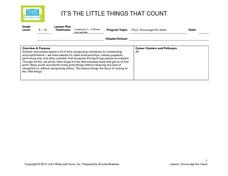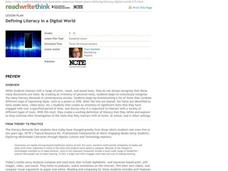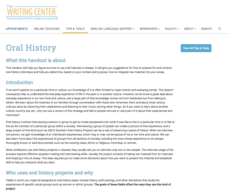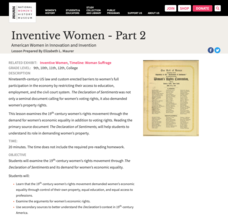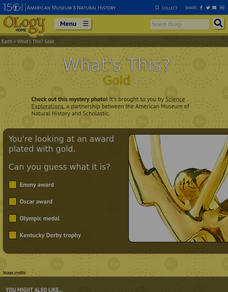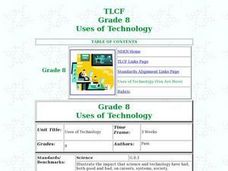Crafting Freedom
Sequencing of Events in the Slave Narrative of Henry "Box" Brown
What steps did Henry "Box" Brown take while planning his own escape from slavery? Learners work in groups to analyze segments of Brown's narrative and identify the sequence of the most important events of his story.
John Wiley & Sons
It's the Little Things That Count
Encourage your young leaders to acknowledge small victories and the unique abilities and strengths of others. Class members are assigned to observe a classmate and note their talents and interests, concluding in an "awards...
Curated OER
Lord of the Flies Anticipation Guide and Activities
“What are we? Humans? Or animals? Or savages?” Ah, the central question of Lord of the Flies. As part of their study of William Golding's riveting novel, readers complete an anticipation guide and respond to a series of survey...
Denver Public Schools
Kung-hsi Fa-ts' ai! – A Chinese New Year Celebration
Looking for ideas for your Lunar New Year celebration? Check out an interdisciplinary unit of study that includes lessons in counting, calligraphy, culture, geography, literature, art, and music. Kung-hsi Fa-ts' ai! (May you...
Curated OER
Woodrow The White House Mouse
Inauguration Day is January 20. Implement an entire week's worth of mini activities to help young historians become knowledgeable of the President's job, the executive branch, and the White House. The worksheets focus on...
Chicago Botanic Garden
Are You Bigfoot?
Scholars independently explore several websites to calculate their ecological footprint. Using their new found knowledge, they answer six short-answer questions and take part in a grand conversation with their peers about how...
Chicago Botanic Garden
Calculating Your Carbon Footprint
Unplugging from technology for one day per week will decrease your carbon footprint—are you up to the challenge? Part two in a series of three allows individuals to explore their personal carbon footprints. By first taking a quiz at home...
Chicago Botanic Garden
Personal Choices and the Planet
How big is your footprint? Activity three culminates the series by having groups complete carbon footprint audits with people in their schools and/or around the districts. Groups then gather their data, create a presentation including...
Chicago Botanic Garden
Calculating Your Ecological Footprint
You can lower your ecological footprint by recycling! Lesson four in this series of five has individuals, through the use of a computer, calculate their ecological footprints. Through discussions and analysis they determine how many...
ReadWriteThink
Defining Literacy in a Digital World
What skills are necessary to interact with different types of text? Twenty-first century learners live in a digital world and must develop a whole new set of skills to develop media literacy. Class members engage in a series of...
Cornell University
Magnetic Mad Libs
Examine the science behind computer communication. After defining the properties of magnets, learners simulate how a computer hard drive works by sending each other binary codes using the magnets. They use these communications to...
Planet e-Book
Les Miserables
Many consider Les Miserables to be one of the greatest novels ever written. An eBook version of Les Miserables by Victor Hugo contains the entire text, translated from the original French. Each section is organized into books...
Kenan Fellows
Terrarium in a Bottle: Modeling the Atmosphere, Greenhouse Effect, and Water Cycle
You've heard of farm to table ... but what about farm in classroom? Junior agriculturalists embark upon a two-week journey into the science of growing things. Based upon the classic terrarium in a two-liter experiment, the lesson goes...
Teaching Ideas
The Victorians Fact Cards
Want to learn some quick facts about Victorian England? Check out a series of fact cards that include information about class structure, education rights, public health, and Queen Victoria herself.
Missouri Department of Elementary
Equine Science
Did you know that horses have two sets of teeth? There is much to learn about horses, of course, and those interested in equine science will learn much from a 10-lesson agricultural science course that covers not only equine dental...
University of North Carolina
Oral History
There's no better way to learn something than to hear it straight from the horse's mouth. A handout on oral history, part of a larger series on specific writing assignments, explains how to conduct interviews and use the information...
Spreading Gratitude Rocks
Gratitude Quote Poster
According to Cicero, "Gratitude is not only the greatest of virtues, but the parent of all others." Pupils explore similar inspirational quotes after watching a time-lapse video. Next, scholars interpret one of the quotes by creating...
National Woman's History Museum
Inventive Women - Part 2
The Declaration of Independence was published in 1776. The Declaration of Sentiments and Resolutions, modeled after the Declaration of Independence, was drafted and read by Elizabeth Cady Stanton at the Seneca Falls Convention in 1848....
American Museum of Natural History
What's This? Gold
Cell phones are likely made of gold—at least part of them! An interesting lesson explains the conventional and not-so-conventional uses of the popular element gold. From the Inca empire to modern-day technology, learners discover gold...
Curated OER
Turmoils of The 1960's and 70's.
Students engage in the study of the social problems associated with the 1960's and 1970's. They explain how the government made attempts to solve the problem and evaluate the success. This is done through the writing of an essay using...
Curated OER
Turbulent Times of the Sixties
Students explore 1960's America. In this American history lesson, students read about and research 1960's political and entertainment figures, social activism, the Civil Rights Movement, and environmentalism as they complete writing and...
Curated OER
Who’s Got Rights? An Introduction to Human Rights and Human Rights Defenders
Students explore human rights issues. For this social justice lesson, students examine human rights as they read segments of the "Universal Declaration of Human Rights," discuss photographs with human rights implications, and play a...
Curated OER
Analyzing the economic, political, social, and cultural transformation of the United States since World War II
Eleventh graders examine political issues in the United States between 1936 and 2000. In this American history lesson, 11th graders study the economy, education, government, civil rights, and sports of this time period. Students compare...
Curated OER
Technology And Our Quality of Life
Eighth graders design a product or machine and determine the impact their invention has on a person's quality of life. They present their design and machine with a description of its possible impacts to an audience of peers and adults.
Other popular searches
- Lyndon Johnson Great Society
- The Great Society
- Johnsons Great Society
- Great Society Programs
- Lbj Great Society
- Johnson and Great Society
- Great Society Johnson
- Johnson's Great Society
- The Great Society Johnson



